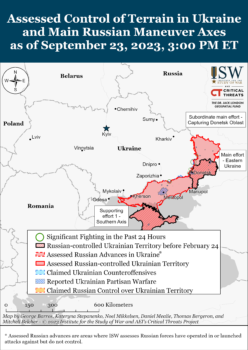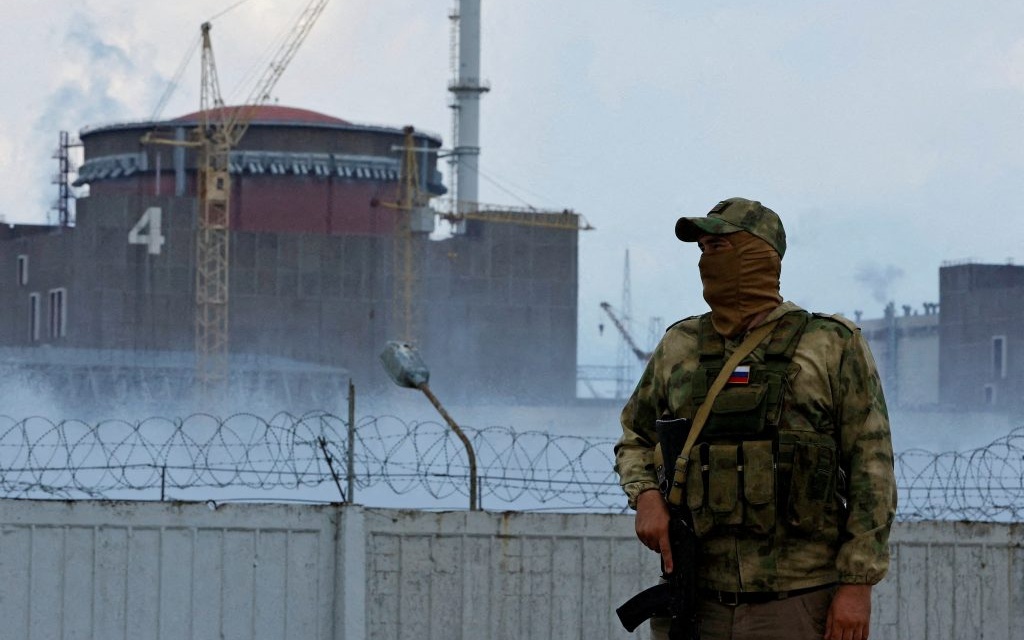A Russian soldier at the occupied Zaporizhzhia Nuclear Power Plant in southern Ukraine, August 4, 2022 (Alexander Ermochenko/Reuters)
Thursday’s Coverage: Zelenskiy — “Progress” on Eastern Front of Counter-Offensive

Map: Institute for the Study of War
UPDATE 1554 GMT:
Ukraine Foreign Minister Dmytro Kuleba has thanked Switzerland for $109.5 million of assistance with de-mining operations.
I am grateful to Switzerland for contributing 100 million CHF to humanitarian mine clearance in Ukraine between 2024 and 2027. Substantial aid in cleaning the Ukrainian soil of Russian mines. I thank @IgnazioCassis and @Violapamherd for their consistent support for Ukraine.
— Dmytro Kuleba (@DmytroKuleba) September 29, 2023
Switzerland is barred by law from providing military assistance to any country — even one which is the victim of aggression — in a conflict. However, this week authorities approved selling back 25 Leopard 2 battle tanks to Germany, freeing up German armor to be delivered to Kyiv.
The Swiss Government also announced “further sanctions in connection with the supply of Iranian drones to Russia” in a statement, bringing Bern in line with European Union measures adopted in July.
“The sale, supply, export and transit of components used for the manufacture and production of unmanned aerial vehicles (UAVs) is now prohibited,” the Government announced.
UPDATE 1540 GMT:
Ukraine’s Foreign Ministry has responded to the comment of Hungary’s Prime Minister Viktor Orbán that “very difficult questions” must be answered before the European Union can start membership talks with Kyiv.
Orbán, a long-time ally of Vladimir Putin, implicitly said that Russia’s occupation of part of Ukraine would have to be accepted.
We don’t know how big the territory of this country is, as the war is still ongoing, we don’t know how big its population is as they are fleeing. To admit a country to the EU without knowing its parameters, this would be unprecedented.
The Ministry said pointedly, “We would like to inform that Ukraine has not changed its territory within its internationally recognized borders.”
The EU is scheduled to decide in December whether Ukraine can begin negotiations on accession, a step requiring the unanimous agreement of the 27 members.
UPDATE 1520 GMT:
The UK has sanctioned another 11 officials and entities over their involvement in Russia’s illegal “allegations” of four Ukrainian provinces: Kherson and Zaporizhzhia in the south and Donetsk and Luhansk in the east.
Russia’s Central Election Commission is cited. Among the sanctioned officials are the CEC’s Natalya Budarina; Andrey Aleksyenko, head of Russian administration in the occupied part of the Kherson region; and Marina Zakharova, head of the Russian proxy election commission in Kherson.
The UK has sanctioned 1,600 individuals and entities over Russia’s invasion.
UPDATE 1045 GMT:
Demonstrating the Kremlin’s control of Wagner Group mercenaries, Vladimir Putin has met founding member and former commander Andriy Torshev.
Thursday’s encounter came three months after Wagner’s mini-rebellion and a month after the likely assassination of Wagner head Yevgeny Prigozhin and other senior officials in a jet crash.
The Kremlin said Putin discussed with Troshev and Deputy Defense Minister Yunus-Bek Yevkurov how the mercenaries are used in the invasion of Ukraine.
It added that Troshev is now an employee of the Russian Defense Ministry.
Putin also said that he wanted to speak about social support for those involved in the invasion.
UK military intelligence assesses that up to hundreds of former Wagner mercenaries have probably started to redeploy to Ukraine as individuals and small groups, fighting for other Russian units.
The exact status of the redeploying personnel is unclear, but it is likely individuals have transferred to parts of the official Russian Ministry of Defense forces and other private military companies.
Several reports suggest a concentration of Wagner veterans around Bakhmut [in the Donetsk region in eastern Ukraine]: their experience is likely to be particularly in demand in this sector. Many will be familiar with current frontline and local Ukrainian tactics, having fought over the same terrain last winter.
UPDATE 0947 GMT:
Russia’s autumn conscription of men for the military will be carried out in occupied Ukrainian regions for the first time.
On Friday, Vladimir Putin has signed a decree for the call-up of 130,000 citizens, following March’s order for 147,000 people.
The Russian Defense Ministry said the call-up will begin from October 1. The term of conscription remains at 12 months.
Russia occupied and “annexed” Crimea in 2014. In September 2022, Vladimir Putin announced the “annexation” of the Zaporizhzhia and Kherson regions in the south and the Luhansk and Donetsk regions in the east.
UPDATE 0908 GMT:
Ukraine’s Security Service SBU has confirmed its responsibility for an attack on an electrical substation in Russia’s Kursk region on Friday.
The SBU said the substation was targeted because it provides electricity to important Russian military facilities. It reiterated that if Russia persists with strikes on Ukrainian infrastructure, then Kyiv will respond in kind.
Kursk’s governor said five settlements and a hospital lost power after the strike.
Russia’s Defense Ministry claimed that air defenses destroyed 10 Ukrainian drones over Kursk and one over the Kaluga region southwest of Moscow.
UPDATE 0634 GMT:
A Russian missile attack has struck an infrastructure facility on the outskirts of Mykolaiv in southern Ukraine.
“Dry grass went on fire there, the fire was extinguished,” Mykolaiv Mayor Oleksandr Sienkevych posted on Telegram. He said details are being clarified.
UPDATE 0611 GMT:
A Ukrainian campaign is appealing to Russians to help return forcibly-deported children to Ukraine.
State-run Freedom TV launched “If You Know, Tell” on Wednesday, in partnership with the Presidential Commissioner for Children’s Rights and the child protection team of Ukrainian police.
The campaign is part of the “Bring Kids Back UA” plan approved by Ukraine President Volodymyr Zelenskiy.
Ukraine officials say they have documented the forced transfer of almost 20,000 children to Russia or Russian-occupied territories during Vladimir Putin’s invasion. Tens of thousands more are feared to have been deported.
The International Criminal Court has issued arrest warrants for Putin and Russia’s “Children’s Rights” Commissioner Maria Lvova-Belova over the deportations.
Freedom TV is guaranteeing anonymity to those who provide information through its digital platforms or a dedicated Telegram channel.
“A large audience in Russia” is following the channel and feedback from viewers indicates that they are willing to help “but do not know how and are afraid of being punished,” said general director Yulia Ostrovska.
UPDATE 0439 GMT:
UK military intelligence assesses that Russia has lost about 90 fixed-wing warplanes in combat during Vladimir Putin’s invasion of Ukraine.
The analysts also note the strain of “extra wartime use”: “The need for extra maintenance is complicated by a shortage of spare parts because of increasing demand and international sanctions.”
UPDATE 0433 GMT:
In his nightly address to the nation, Ukraine President Volodymyr Zelenskiy spoke of his discussions with French Defense Minister Sebastien Lecornu and with UK Defense Minister Grant Shapps about joint weapons production and bolstering of air defenses.
I am holding talks with Ukraine’s key partners on our ongoing cooperation, steps to strengthen our warriors, our strategy on the path to victory, and joint work to increase arms co-production. I thank all partners who stand with us, counter Russian terror, and bring peace closer. pic.twitter.com/jkZeyhrwiO
— Volodymyr Zelenskyy / Володимир Зеленський (@ZelenskyyUa) September 28, 2023
UPDATE 0350 GMT:
Russian artillery shelling killed at least three women in Kherson city in southern Ukraine on Thursday.
The three women were on the street when the Russians fired on a residential area.
The Ukraine Prosecutor General’s office said, “Two minor children were evacuated near the scene. They have been examined by doctors and a psychologist is currently working with them.”
Two people were killed in the Donetsk region in eastern Ukraine.
ORIGINAL ENTRY: Ukraine has been voted onto the Board of Governors of the UN’s International Atomic Energy Agency, amid ongoing concern about Russian occupation of the Zaporizhzhia Nuclear Power Plant.
An IAEA statement announced the election of 11 countries to the 35-member Board for 2023-2024: Algeria, Armenia, Bangladesh, Burkina Faso, Ecuador, Indonesia, South Korea, Netherlands, Paraguay, Spain, and Ukraine.
Kyiv was last on the Board from 2009 to 2011.
Ukraine President Volodymyr Zelenskiy responded:
Ukraine has been elected to the IAEA Board of Governors for 2023–2025. I thank every country that supported our bid.
Ukraine remains a reliable partner in the nuclear energy sector and we will make every effort to reinforce the IAEA's important role and to strengthen global…
— Volodymyr Zelenskyy / Володимир Зеленський (@ZelenskyyUa) September 28, 2023
Russia seized the Zaporizhzhia plant, Europe’s largest with six nuclear reactors, in the first days of its February 24, 2022 invasion. The occupiers turned the complex into a military base, using the position to fire at Ukrainian-held territory across the Dnipro River in the Zaporizhzhia region in southern Ukraine.
Amid shelling, power has been periodically cut to the plant, threatening the cooling of the dormant reactors. In July, IAEA inspectors found mines at the complex, backing up Ukrainian concerns that Russia could set off an explosion similar to the destruction of the Nova Kakhovka Dam on June 6.
The Russians have also been accused of harassing and even abducting senior staff of the plant, consolidating its takeover under the supervision of Moscow’s officials.
On Thursday, Greenpeace warned that the IAEA cannot properly monitor safety at Zaporizhzhia, with only four inspectors and restrictions on their access.
Shaun Burnie and Jan Vande Putte, Greenpeace’s nuclear specialists, concluded, “The IAEA risks normalising what remains a dangerous nuclear crisis, unprecedented in the history of nuclear power, while exaggerating its actual influence on events on the ground.”
Citing satellite imagery and track marks, the analysts said Russia routinely fires Grad or Smerch rockets at Ukrainian launchers from launchers between 1 km and 18 km from the plant.
The Russian military is also likely “to be using the proximity of the nuclear power plant as a shield” to deter Ukrainian fire.
The IAEA responded in a statement that inspectors were on site since September 2022. Without their presence, “the world would have no independent source of information about Europe’s largest nuclear power plant”.

